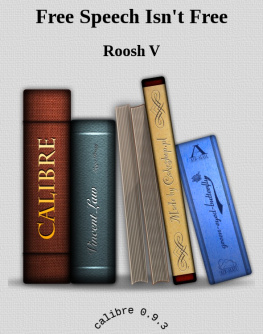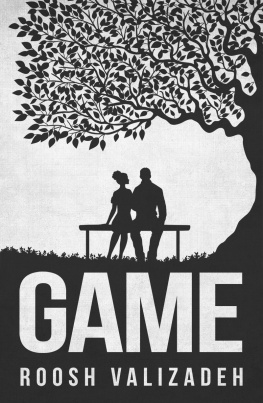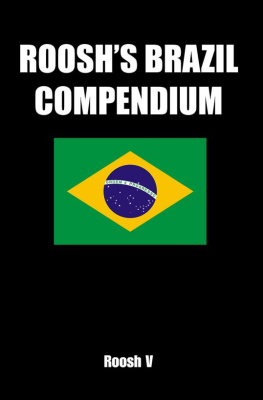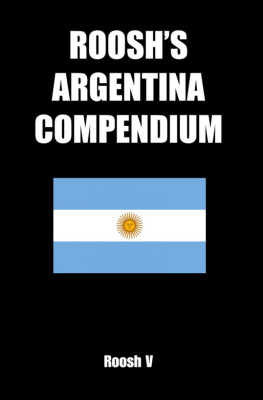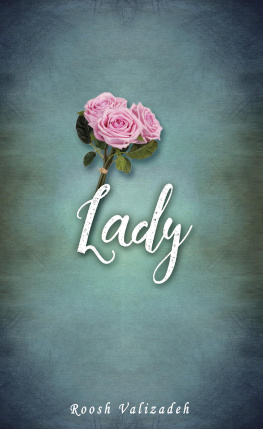All rights reserved.
Here I am, readyto give two private speeches to men, I said to Canada.
No, you cannot,they replied. We dont like your words and ideas.
Well, Im goingto give them whether you like it or not.
We declare waron you, they yelled, stomping their feet.
I tightened myface and said, I accept your declaration.
Foreward
The following foreward is written by Quintus Curtius.
I was very pleased to learn late in 2015 that RooshValizadeh was writing a book on his Canada lecture tour that had taken placeearlier that year. I believe that the lecture tour, and the attention that itgenerated, were significant events, deserving of a book that would treat themin some detail from a personal perspective. I will try to explain why I believethis to be so.
We should begin with some preliminarybut necessarymatters.The historian J.B. Burys The Idea of Progress challenged theconventional view that history has been, and would remain, a continuouslyforward progression towards cultural perfection and human happiness. To besure, the idea is so deeply ingrained in our modern psyches as to requirelittle or no mental effort to analyze. He notes:
We now take it so much for granted, we are now so consciousof constantly progressing in knowledge, arts, organizing capacity, utilities ofall sorts, that it is easy to look upon progress as an aim, like liberty or aworld-federation, which it only depends on our own efforts and good-will toachieve.
But is this really true? Do we have sufficient informationto test this idea? To believe mankind is moving in the right direction, onewould have to know what the ultimate destination must be. And this assumptionsmacks of conceit. Bury reminds us that the very idea of human progress is aproduct of the eighteenth century Enlightenment; and that before this time,very different views of society and history prevailed.
None of the prominent ancient peoplesGreeks, Romans, Chinese,or Indianssubscribed to progress as a desirable or inevitable goal ofmankind. Instead, they were fixated on the concept of cycles. Human history, inthe ancient Greek view for example, was an unending story of birth, rise,decay, and inevitable collapse; and there could be no real escape from thisinexorable cycle.
There was very little that was new in the world, exceptarrangement. Humans ignored this truth at their own peril. To push things toofar was to incur the wrath of the offended gods, and this would lead to promptand bitter chastisement. Greek tragedy drummed this lesson into the heads andhearts of its listeners, with profound and far-reaching results.
Ciceros short essay The Dream of Scipio, forexample, posited a world controlled by the harmony of the heavenly spheres,which would complete a full cycle or great year (magnus annus) roughlyevery 12,000 to 15,000 years. Plato believed human social systems were governedby cycles that also followed definite patterns: aristocracy, oligarchy,democracy, and tyranny.
These ideaswhich are easy for some of us arrogant modernsto look down our noses atdid not amount to a prejudice against change. It wassimply that ancient mans focus was different. Instead of finding satisfactionin the development of technological toys, the ancient thinkers believed it wasmore important to focus on the perfectibility of ones body, character, andsoul. Mechanical contrivancessuch as Hieron of Alexandrias rotary steamengine assembled for the amusement of Ptolemywere kept where they belonged, asritualized toys. The idea that society as a whole was inexorably headed towardssome blissful future state of happiness would have struck ancient and medievalman as strange, even blasphemous.
If we give the cycle view of history its due, we quicklysee that time itself can function equally as enemy as well as friend. Nations(or persons) advance, reach a certain peak, decline, and then make way forothers. Time is not our trusted burro, carrying us merrily along a pathway tounearned beatitude. Time is as much a destroyer as a creator: and perhaps moreof the former than the latter. As the Roman poet Horace put it (OdeVI.45): What does ruinous time not undermine?
The idea of inevitable progress is also a conveniently comfortableone, for it relieves the holder of any need to struggle for the attainment ofthe ends which he so values. One can just coast along, blissfully ignorant ofthe corruption around oneself, and take refuge that it will all work out in theend.
And yetvery often in history, in factthings do not justwork out automatically. Civilization and its blessings must be sacrificed andfought for, over and over unceasingly, lest these hard-won gains be againsubmerged back into a sea of ignorance and barbarism. The things that we take forgranted today (freedom of speech, material comforts, political stability, toname a few) would be gone in a few generations if each era did not do its part.Victories, once won, are not permanent: they must be re-won by everygeneration.
By now the reader is likely wondering to himself what allthis has to do with Rooshs speaking tour in Canada. It is simply this. Wecommonly hear that modern society is more free and tolerant than it hasever been, and that we are in the midst of a golden age of personal liberty andthe free exchange of ideas.
The idea, as I stated previously, is so commonplace as to benearly unquestioned. The internet, we are told, has opened up new andincredible vistas of the mind. But is this true? Are we progressing ever upwardsin our tolerance of free speech and a free press? Or are there more subtle,insidious ways of stifling free speech? Rooshs Canada experience was ahistoric opportunity to test this hypothesis; and the test results, as it were,are hardly encouraging.
It is worth pointing out here something that some may findself-evident. And this is the fact that freedom of speech and the press is anabsolute necessity for any forward-moving society. This freedom is apparentlynot as valued as many would like to believe. Since 2001, Americans haveaccepted more and more features of the surveillance state as a necessary evilin the fight against terror.
It was not always so. One of the first modern advocates ofpress freedom (and certainly the most eloquent) was English poet John Milton.In England in the early 1640s, all books and pamphlets published in Englandwere required, under an old law, to be registered and licensed by the civilauthorities. The law was selectively enforced. In his justly famous work Areopagitica(released in 1643), he penned this ringing invocation to freedom of thought:
We should be wary therefore what persecution we raise againstthe living labors of public men, how we spill that seasoned life of manpreserved and stored up in books; since we see a kind of homicide may be thuscommitted, sometimes a martyrdom, and if it extend to the whole impression, akind of massacre; whereof the execution ends not in the slaying of an elementallife, but strikes at that ethereal and fifth essence, the breath of reasonitself, slays an immortality rather than a life.
Here, at least, is a theoretical sympathy for the idea thatdifferences of opinion should be tolerated. In Puritan England, this was a boldstance to take. Yet Milton was a friend of Parliament and a prominent literaryman. And even he did not advocate tolerance for Catholic or atheisticviewpoints. It would take many more years of struggle before those battleswould be won, but won they were.
As I noted above, the freedom for people to speak and writeas they wish is an essential prerequisite for a forward-moving social system.Societies that wall themselves off from outside ideas and currents of thought,or that repress the expression of ideas that contradict popular beliefs,gradually lose the ability to innovate. Most, if not all, Americans would agreewith this statement. But in practice, we find all sorts of mental gymnasticsperformed to make end runs around this principle when the ideas in question aretoo different.

